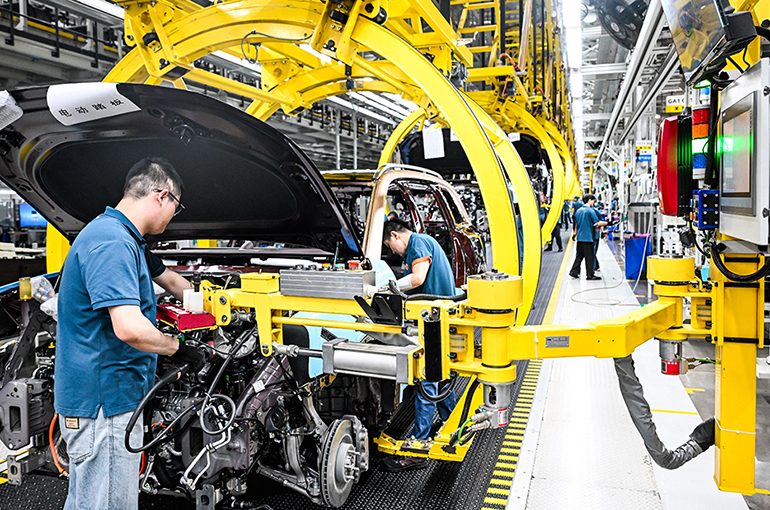 China's Industrial Capacity Utilization Rises in Third Quarter as Anti-Involution Policies Show Results
China's Industrial Capacity Utilization Rises in Third Quarter as Anti-Involution Policies Show Results(Yicai) Oct. 23 -- China's industrial capacity utilization rate improved in the third quarter from the second quarter, mainly because the anti-involution policies started to take effect and show results, according to analysts.
The industrial capacity utilization rate of Chinese industrial enterprises above the designated size came in at 74.6 percent in the third quarter, up from 74 percent in the second quarter but down from 75.1 percent a year earlier, according to data released by the National Bureau of Statistics on Oct. 20.
The producer price index fell 2.3 percent in September, slower than the 2.9 percent decline in August, per NBS data released earlier this month. The total profit of industrial firms above the designated size rose 0.9 percent to CNY4.69 trillion (USD642.8 billion) in the first eight months of the year from a year earlier, compared with a 1.7 percent drop in the first seven months, NBS data also showed.
"Anti-involution policies have driven improvements in the industrial capacity utilization rate, PPI, and industrial corporate profits," Luo Zhiheng, chief economist at Yuekai Securities, told Yicai, adding that the capacity utilization rate has stabilized and rebounded after a counter-seasonal decline in the second quarter.
Anti-involution policies are measures pushing against cutthroat, self-defeating competition that does not result in profit growth but instead damages economic development.
The improvement in industrial indicators was particularly notable in the electrical machinery and automotive sectors, reflecting the positive impact of anti-involution measures, said Guo Lei, chief economist at GF Securities. General equipment and computer communication electronics also reported increases in utilization rates, thanks to relatively active investment in new industries, he added.
"Involution-style competition has evolved from localized price wars into a systemic issue affecting multiple industries and entire supply chains," Wu Chaoming, chief economist at Chaosheng Financial Holding, told Yicai. He emphasized that expanding domestic demand remains crucial to address the involution issue during this transitional period of the economy.
The sixth meeting of the Central Commission for Financial and Economic Affairs on July 1 emphasized the need to regulate low-price disorderly competition, guiding enterprises toward product quality improvement and facilitating the orderly exit of outdated capacity.
Afterward, various anti-involution policies were implemented across sectors. Six government departments held talks with photovoltaic enterprise representatives to regulate market competition, the China Association of Automobile Manufacturers issued four measures against irrational competition, and the State Administration for Market Regulation warned food delivery platforms not to issue malicious subsidies.
Editor: Futura Costaglione